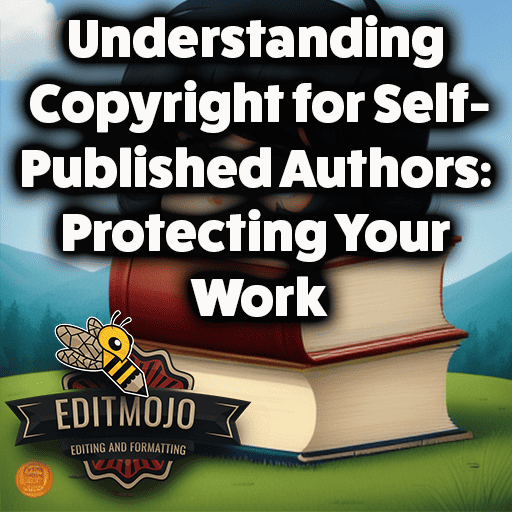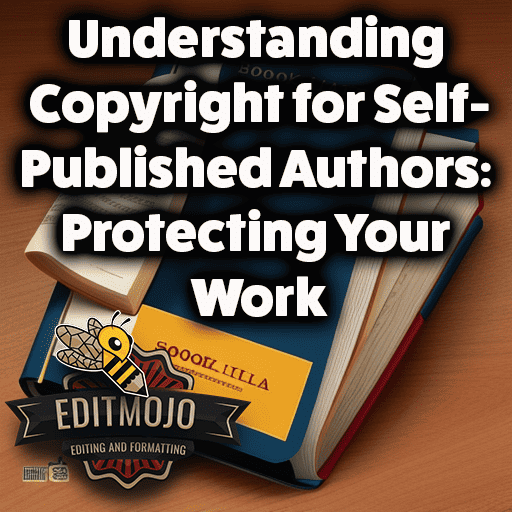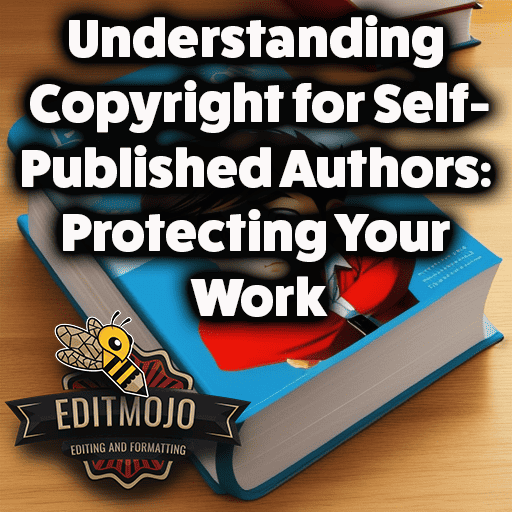Understanding Copyright for Self-Published Authors: Protecting Your Work
Understanding Copyright for Self-Published Authors: Protecting Your Work. Copyright protection is like a superhero’s cloak, invisible yet vital, ensuring the creator’s control over their own work. As a self-published author, understanding this cloak is pivotal to protect your creative treasure. This guide will unpack the intricate world of copyright to help you safeguard your works with confidence.
Key Takeaways
| Section | Key Point |
|---|---|
| Understanding Copyright Basics | Copyright protects original works of authorship, granting authors exclusive rights over their works. |
| Debunking Common Copyright Myths | Copyright is automatic upon creation; online content is still subject to copyright law. |
| The Self-Publishing Boom and Copyright | Self-published authors are at a higher risk for copyright infringement and must take additional precautions. |
| Copyright Registration: Pros and Cons | Registering copyright can offer additional legal benefits, such as proof of ownership. |
| Fair Use and Its Implications for Authors | Fair use allows limited use of copyrighted material without permission, but misinterpretation can lead to legal consequences. |
| How to Detect and Handle Copyright Infringement | Proactive monitoring and knowledge of the correct course of action is crucial to handle copyright infringement. |
| Copyright in the Digital Age: eBooks and Blogs | Additional precautions, like using digital watermarks or metadata, are required to protect digital content. |
| International Copyright Law: Protecting Your Work Abroad | International copyright law is complex, but certain treaties facilitate international copyright protection. |
| Copyright and Contracts: Working with Publishers, Editors, and Agents | Understanding copyright-related clauses before signing any contracts is crucial. |
II. Understanding Copyright Basics
A. Definition and Explanation of Copyright
Copyright, as described by the U.S. Copyright Office, is a form of intellectual property law that protects original works of authorship including literary, musical, dramatic, and artistic works. This “cloak” gives the copyright owner exclusive rights, including reproduction, distribution, performance, and display of their protected works.

B. The History and Evolution of Copyright Laws
Originating in England as the Statute of Anne in 1710, copyright law has evolved globally, adapting to technological advancements. Nowadays, copyright is not just about protecting paper and ink but bytes and pixels too.
C. Why Copyright is Crucial for Authors
Copyright empowers authors to reap the rewards of their creativity. It protects against unauthorized usage, allowing authors to maintain control over their work’s use and distribution, whether sold, shared, or performed.
D. The Kinds of Work Copyright Protects
From the epic novel you spent years crafting, the insightful blog post you shared last week, to the evocative poem you penned in your diary, copyright protects all. No work is too small or insignificant for the cloak.

III. Debunking Common Copyright Myths
A. “Copyright is Automatic”
Yes, this is true! According to the Berne Convention, copyright is automatic upon creation. This means the moment your pen leaves the paper, or your fingers leave the keyboard, your work is under the protective umbrella of copyright.
B. “I Need to Register to Protect My Work”
Contrary to this belief, your work is protected even without registration. However, registering your copyright can offer additional legal benefits, such as providing evidence of ownership.
C. “If it’s on the Internet, it’s Free to Use”
This is a dangerous myth! Online content is still subject to copyright. Unauthorized use can lead to copyright infringement.
D. “I Don’t Need to Worry About Copyright Since I’m Not Famous”
No matter how big or small your audience, protecting your work is essential. Copyright infringement can happen to anyone. Fame is not a prerequisite for protection.

IV. The Self-Publishing Boom and Copyright
With self-publishing becoming increasingly popular, understanding copyright has never been more important. Without the traditional safeguards provided by publishing houses, self-published authors are often more vulnerable to copyright infringement.
V. Copyright Registration: Pros and Cons
Registering your copyright, while not necessary, can provide additional protection. The U.S. Copyright Office provides a straightforward copyright registration process. However, it can be time-consuming and does come with a fee.
VI. Fair Use and Its Implications for Authors
Fair use, as explained by Stanford University Libraries, allows limited use of copyrighted material without permission. However, it’s a grey area in copyright law, and misinterpretation can lead to legal consequences.
VII. How to Detect and Handle Copyright Infringement
Proactive monitoring
is key. Tools like Google Alerts can help detect potential infringement. If your work is infringed upon, you can send a cease and desist letter, file a DMCA takedown notice, or seek legal advice.
VIII. Collaborative Writing and Copyright
Joint authorship can be a tricky terrain. It’s important to define rights and responsibilities beforehand to avoid disputes. Remember, communication is key in collaboration.
IX. Copyright in the Digital Age: eBooks and Blogs
Digital platforms bring their own copyright challenges. It’s essential to take extra precautions, like using digital watermarks or metadata, to protect your work in these spaces.
X. International Copyright Law: Protecting Your Work Abroad
Protecting your work internationally can be complex, with varying laws in different countries. However, treaties like the Berne Convention facilitate international copyright protection.
XI. Copyright and Contracts: Working with Publishers, Editors, and Agents
Always read the fine print! Ensure you understand all copyright-related clauses before signing any contracts. When in doubt, seek professional advice.
XII. Conclusion (Understanding Copyright for Self-Published Authors: Protecting Your Work)
As a self-published author, understanding copyright is your secret weapon to safeguard your work. Stay vigilant, stay informed, and let your creativity soar under the protective cloak of copyright.
XIII. Resources for Further Reading
Check out The Copyright Handbook for a deep dive into copyright law. The Authors Guild also offers excellent resources.
XIV. Frequently Asked Questions
1. Can I use a song lyric in my book?
Potentially, under fair use, but it’s a grey area and seeking permission is often the safer route.
2. What if someone uses my work without permission?
Consider legal advice, send a cease and desist letter, or file a DMCA takedown notice.
Remember, your work is your legacy. Protect it like the treasure it is!
Top Five Questions and Answers (Understanding Copyright for Self-Published Authors: Protecting Your Work)
- Q: Is copyright automatic, or do I need to register my work? A: Copyright is automatic upon creation. However, registering your work with the copyright office can provide additional legal benefits.
- Q: Can I use someone else’s work in my book under ‘fair use’? A: Fair use can allow limited use of copyrighted material without permission, but it’s a grey area in copyright law. It’s always safer to seek permission.
- Q: How can I protect my eBook or blog from copyright infringement? A: Use tools like digital watermarks or metadata for protection. Also, consider copyright notices and proactive monitoring for potential infringements.
- Q: How can I protect my work on an international scale? A: International copyright protection can be complex, but treaties like the Berne Convention help facilitate this. Consult with a legal expert for tailored advice.
- Q: What should I do if I find someone infringing on my copyright? A: Consider seeking legal advice, sending a cease and desist letter, or filing a DMCA takedown notice.
